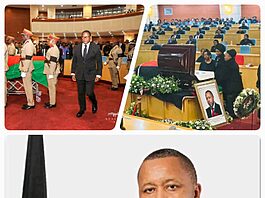
Debunking Notions: Bon Kalindo Asserts Government of National Unity Not Feasible in Current Malawi Context
By Burnett Munthali
In recent political discourse, Bon Kalindo has made a poignant assertion regarding the feasibility of establishing a government of national unity in Malawi at this juncture. His remarks come amidst speculations and debates surrounding the potential for such a coalition government to foster stability and inclusivity in the country’s political landscape.
Kalindo, a vocal advocate for social justice and political transparency, has argued that the current political climate in Malawi does not lend itself to the practical implementation of a government of national unity. He highlights several key factors contributing to this viewpoint:
Firstly, Malawi’s political landscape is characterized by diverse party affiliations and shifting alliances, often resulting in fragmented governance and challenges in achieving consensus on critical national issues.
Secondly, Establishing a government of national unity would necessitate significant amendments to constitutional frameworks governing executive appointments, legislative processes, and the distribution of political power. Such reforms require broad-based consensus and rigorous legal scrutiny.
Thirdly, Managing coalition dynamics, balancing diverse policy priorities, and ensuring effective governance under a unified leadership structure pose substantial operational challenges. These complexities may outweigh perceived benefits in promoting stability and long-term governance effectiveness.

Kalindo’s perspective underscores the importance of pragmatic assessment and strategic planning in advancing national unity efforts. While the concept of a government of national unity holds theoretical appeal as a mechanism for bridging political divides and promoting collaborative governance, its practical implementation requires careful consideration of institutional capacities, public trust, and political will.
Moreover, the efficacy of such a governance model hinges on transparent dialogue, inclusive decision-making processes, and sustained efforts to address underlying socio-economic disparities and governance inefficiencies.
As Malawi continues its democratic evolution, stakeholders across the political spectrum must engage in constructive dialogue and consensus-building efforts aimed at strengthening democratic institutions, promoting accountable governance, and advancing the collective aspirations of the Malawian people.
In conclusion, while discussions on a government of national unity persist, Bon Kalindo’s assessment challenges stakeholders to critically evaluate the feasibility and implications of such a political arrangement within the current Malawian context. By fostering informed debate and strategic collaboration, Malawi can navigate its path towards inclusive and sustainable democratic governance.






